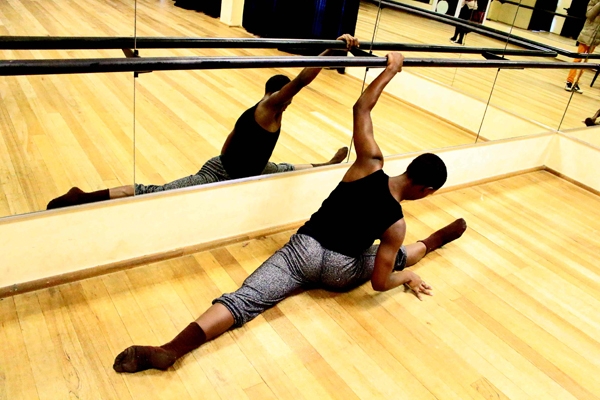

Local dancer Aviwe November hopes to go to dance school in the United States. Photo by Masixole Feni.
12 September 2014
Local dancer Aviwe November will soon be heading to the United States where he has been awarded a two-year scholarship with the Alonzo King LINES Ballet in San Francisco.
But November, who was meant to start his training this month, has been struggling to raise money to pay for his living expenses as the scholarship only covers his tuition.
The 21-year-old grew up with his mother and five older siblings in the small township of Zolani situated about 200km from Cape Town . His mother, a single parent, still works there as a seasonal worker at a fruit canning factory.
“I had never heard about ballet before, but when I tried it for the first time, I fell in love immediately,” he says.
November and his cousins, Siphe and Mthuthuzeli November, were first introduced to classical ballet in 2007 when dance teacher Fiona Sargeant of Dance for All started classes in the community as part of the dance company’s rural development programme.
“There wasn’t much to do while growing up there. My cousins and I enjoyed dancing kwaito together,” he says.
November is charming, bright and clearly determined. He decided to become a professional dancer after watching a performance of Swan Lake for the first time in 2010.
After passing matric, he was offered a three-year scholarship with the Cape Academy of Performing Arts in 2011. Since then, he has attended two summer scholarship programmes at the Washington Ballet School and at Alonzo King LINES Ballet in San Francisco.
“There are so many sacrifices you make on a scholarship because hard work comes first. Unlike other children, I couldn’t call my mom and ask for some money when I ran out, because I knew she didn’t have any,” he says.
November says while he enjoys different genres of dance, he loved neoclassical ballet.
“That’s exactly what they focus on in San Francisco. I got a scholarship to go back for two years, but I need to raise money for food, rent and other things. The trainee programme starts this month, but they are giving me until the end of the year to raise the rest of the money,” he says.
During his time in San Francisco earlier this year, November says he enjoyed attending the grueling classes with well-known choreographer Alonzo King.
Between 9am and 6pm, he attended several classes a day including ballet class, contemporary dance, choreography and partnering.
“It was amazing and very difficult. It changed the way I see myself as a dancer. I wanted to absorb as much as I could from his class … to see how everyone interprets dance differently. I think South African dancers have something special,” he says.
November giggles as he recalls how reluctant his family was when he told them he was going to become a ballet dancer.
“My mom never really agreed … she was worried that dance would get in the way of school work. When I got the scholarship, it proved to her that I could do both. My mother didn’t have money to pay for dance things so I had to use what I had. They are very proud of me. I still go back to do classes there [Zolani],” he says.
To make extra money, November teaches and choreographs for dance studios around Cape Town.
“There’s a future for young dancers here, but it depends on how bad they really want it. You need to give it your all. In the next few years, I see myself choreographing and hope to be known internationally for it,” he says.
November’s two cousins have also received scholarships to dance at the Canadian Ballet School and the Alvin Ailey School in America.
“Dance for All became a second family for us where everyone knew each other,” he says.
Dance for All co-founder and CEO Philip Boyd says he established a trust in the name of his late wife, Phyllis Spira, about five years ago which assists in funding students like November to pursue their dreams.
“We have 1,500 students. We’ve been running for the last 23 years. Aviwe and his cousins are very talented. We recognised this and it was arranged with Debbie Turner for Aviwe to attend CAPAB,” says Boyd.
November is one of dozens of its students who come from rural and poor areas, have gone through the programme, and gone on to dance professionally, both locally and abroad.
“We have outreach classes at farm schools in Montagu, Ashton and in Barrydale. We also have programmes running in Delft, Khayelitsha, Langa and Gugulethu. To subsidize the training of these children costs a lot of money. We have to raise R4million a year of which R1million is funded by the province,” says Boyd.
To make donations towards Aviwe November’s living expenses, contact 074 816 6589.